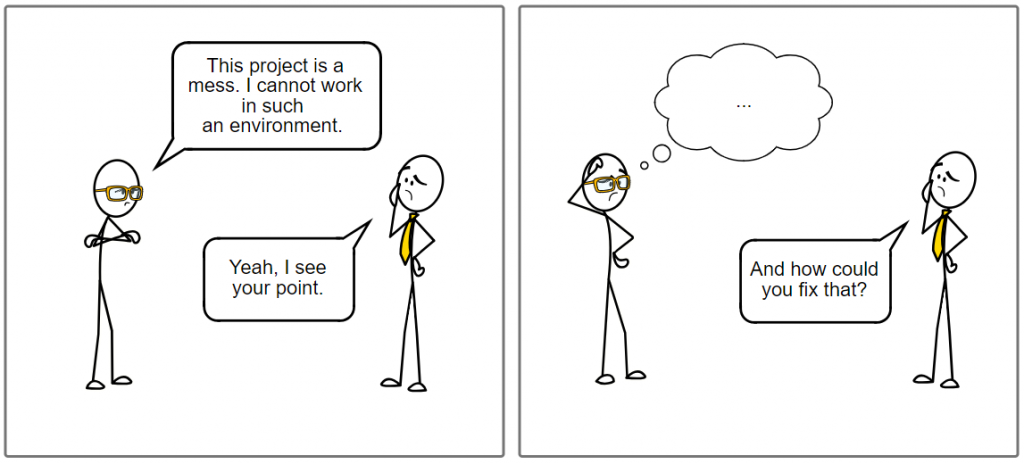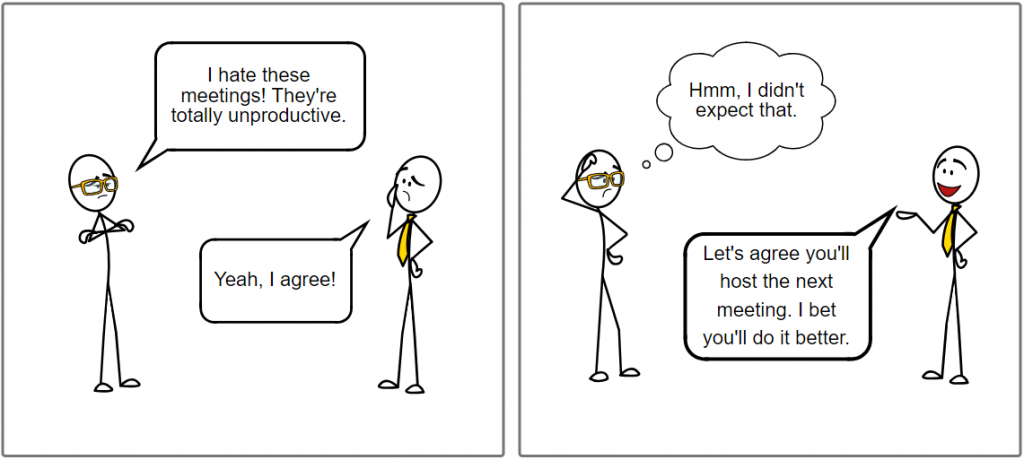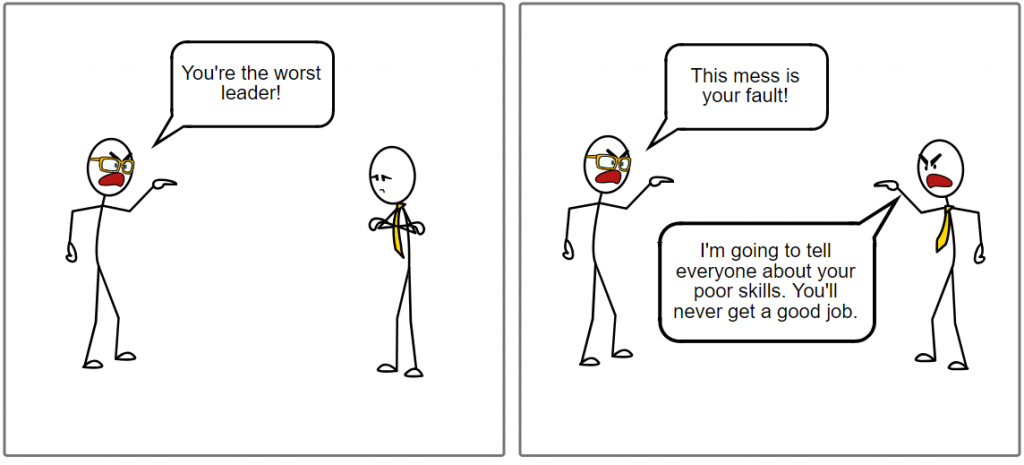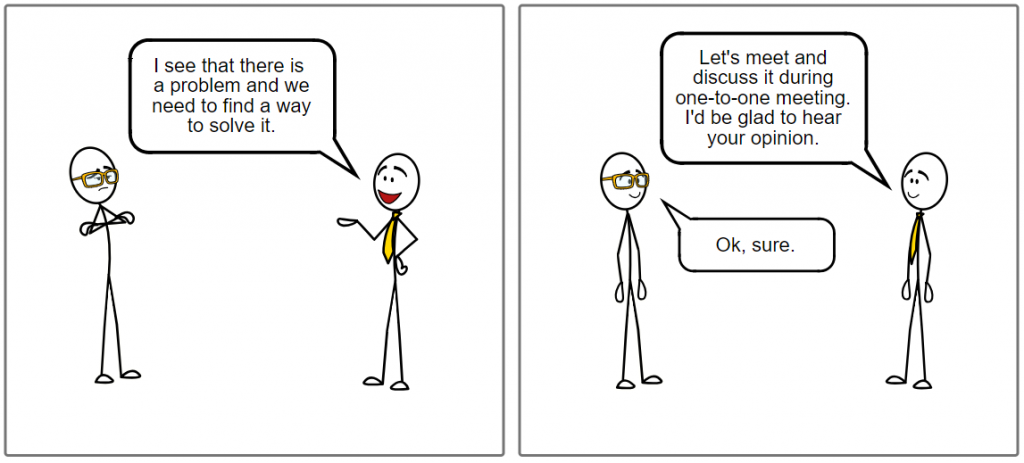
You walk into the office feeling energized. You drink a cup of coffee while having a delightful chit-chat in the social room. You’re about to start your daily duties feeling motivated and cheerful. But there is this one person or maybe even a few of them who will definitely kill your positive attitude. They will take away all your energy which in turn will decrease your job satisfaction. That’s because even if you’re an expert and you love your job, your satisfaction depends heavily on the quality of relations with other coworkers. It stands to reason then that toxic people will affect your attitude as well.
Sometimes you don’t have a choice
However, dealing with toxic people is not easy. Especially, if you are not able to isolate yourself from them and you have no other choice than to work with them. They can be your coworkers, bosses, customers or other people you need to interact with. You can read about a few symptoms of toxic people in my previous article. Not only do those people decrease the entire team’s performance but they also alienate other coworkers and ruin the work atmosphere.
If you currently experience this problem, don’t be alarmed. You’re not alone. This issue is universal. Psychologists Alan A. Cavaoila, Ph.D. and Neil J. Lavender, Ph.D. surveyed over 1,100 employees. According to the data [1] they gathered about 80% of employees experienced severe stress due to dealing with a toxic coworker. You cannot be happy at work if there is a person who takes away your morale. I believe that a few tips I present below will help you avoid becoming the victim next time you deal with a toxic person in your workplace.
Don’t take it personally
I know, easier said than done. But chances that you’re not the reason for people’s toxic behavior are quite high. People often become toxic because they’re not satisfied with their job, they feel insecure, they use rudeness as a defense mechanism or more often than not, they are simply unaware of how toxic their behavior is. One research [2] showed that people actually lack self-awareness, especially at work. It means they can have a problem with understanding the impact of their poor behavior on others. They just don’t realize they’re killing the atmosphere at work.
There can be many reasons why people are toxic but it isn’t necessarily connected with you specifically. Even if they are rude to you, they blame you for all the issues and they’re not very civilized, don’t try to look for personal causes of the problem. From my experience, it’s not like those people hate you, it’s just their general demeanor at work or in life. They use poor communication techniques and manipulate others in order to accomplish their goal and that’s all. And typically, they don’t even realize they are doing something wrong until you make them aware of it.
Stay away from complainers
Complainers and negative people are the ones that drain your energy and positive work attitude. They tend to complain about everything and what is worse they are rarely focused on finding a solution. Each time you meet them they want you to join their pity session. Sometimes you feel pressure to listen to complainers because it can seem rude to just walk away. But you need to take care of your own sanity. There is one method that I like which helps quickly quiet down a complainer and change a conversation into a productive session. You can simply agree and ask your complainer an open question.

You need to set the limits of a conversation which will lead to a productive solution. What’s more, you put the pressure on “you” in this situation by asking “How could you fix that?”. That’s something complainers hate. It’s easy to place the blame on others and to look only for negatives but it’s much harder to fix a problem, especially if it has to be done by complainers themselves. Such questions can stop you from taking part in their negative emotional spiral.

Don’t take part in fights
Stay away from the fight. I feel like a parent of a school kid right now but that rule is actually true. Fighting is typically not a solution. You can spend plenty of time and energy on the conflict and after a while you can easily forget why you were fighting in the first place. You’ll be fighting just for the sake of fighting and that’s when you lose your goal. That’s a sure way to damage your reputation and reveal all your weaknesses.

Exposing yourself to stressful situations can uncover how you use poor arguments in discussions, how you abuse others or how you’re unable to control your emotions. Simply put, it can do a lot of damage and paint your picture as not a very professional worker. Do you want to be seen as an arguer or someone who can calmly resolve conflicts?
Always keep in mind that if you opt for a battle, one of you will end up losing, which means that all of you will lose since it won’t be beneficial to either your image or to the rest of the team. I know it’s instinctive to react instantly when someone treats you badly. It’s more natural to be impolite when you feel threatened or harmed. But try to take a deep breath instead and analyze the situation from different points of view, then wait a moment and prepare what you want to say. If your words are affected by anger, it’s better not to speak at all. Like Dr. Laurence J. Peter said:
“Speak when you are angry and you’ll make the best speech you’ll ever regret.”
Be nice to the offender
And here it is. The most powerful and, at the same time, the most difficult tip. When someone seems to hate you or is rude to you, just smile and say “Hey, how’s it going?” any time you run into them in the office. You don’t need to talk for a long time. But just be positive whenever a toxic person is not. Showing respect to people is evidence of not only good manners but also professional attitude. Moreover, it’s harder to dislike people who are nice to you. It’s possible that after some time you will turn your hater into a more neutral person.

Being nice is also good for your health. Kindness releases the hormone called oxytocin, which reduces the risk of heart disease. Thanks to a positive outlook on life and a pleasant attitude towards others you can strengthen your heart physically and emotionally. I believe it’s a good enough argument to learn how to control negative emotions at work.
“Oxytocin causes the release of a chemical called nitric oxide in blood vessels, which dilates (expands) the blood vessels. This reduces blood pressure and therefore oxytocin is known as a ‘cardioprotective’ hormone because it protects the heart (by lowering blood pressure).”
Suggest a one-to-one conversation
Offer your difficult coworker the opportunity to share his negative thoughts. If you notice that someone seems to be spreading their poisonous attitude onto you, suggest a one-to-one conversation. Don’t try to defend yourself from the very beginning and look for the best arguments but rather listen to all their comments. Show a genuine interest in what the offender is telling to you. The better you understand each other, the better solution you can find together. Sometimes sharing their negative comments in order to release the pain is enough, so let the toxic person open up.

I know that speaking with really troublesome individuals isn’t easy to handle but there is nothing wrong with trying. If it doesn’t work you can always reach out to a leader or a manager to discuss that problem. But at least you try. Such proactive attitude will definitely be noticed by your manager as a positive trait.
Conclusion
Don’t let toxic coworkers drain your energy and kill your motivation. As a conscious communicator you need to always stay professional. Even if they criticize you, manipulate others or gossip about everyone, you still need to act as a role model.
It’s tempting to act equally hostile in response to their behavior but you need to keep in mind that you always have spectators around. And other people will judge you especially when you’re exposed to difficult situations at work. And it’s those difficult situations that can reveal all your weaknesses.
References
[1] Alan A. Cavaiola PhD. (2000). Toxic Coworkers: How to Deal with Dysfunctional People on the Job. New Harbinger Publications.
[2] Ehrlinger, Joyce & Johnson, Kerri & Banner, Matthew & Dunning, David & Kruger, Justin. (2008). Why the Unskilled Are Unaware: Further Explorations of (Absent) Self-Insight Among the Incompetent. Organizational behavior and human decision processes. 105. 98-121. 10.1016/j.obhdp.2007.05.002.
[3] David R. Hamilton PhD. (2017). The Five Side Effects of Kindness: This Book Will Make You Feel Better, Be Happier & Live Longer. Hay House Uk.